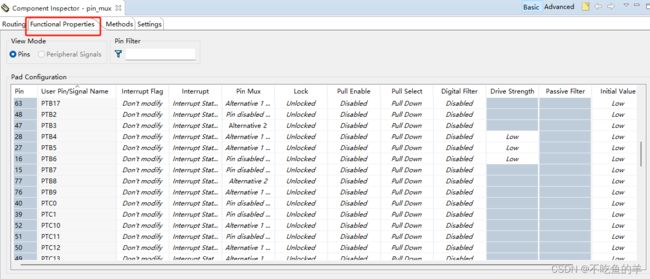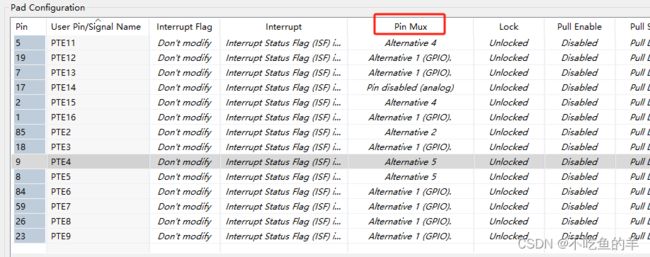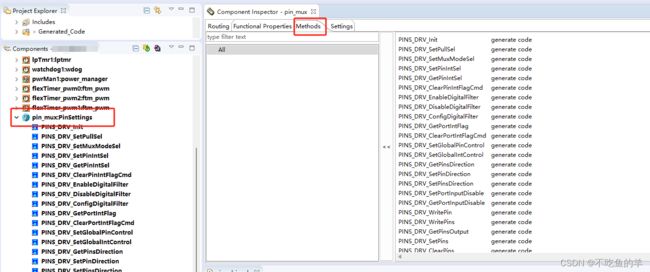S32 Design Studio PE工具配置GPIO
首先我们来讲最简单的GPIO配置
代码生成
按照下图步骤就能配置一个基本的GPIO口,在组件里面选择pin_mux,选中就能配置使能和方向,no pin routed就是没有配置的。GPIO口分ABCDE组,每组从0到最大的序号。
 然后在functional properties里面配置具体每一个引脚的复用、锁定、上拉下拉、数字过滤、输出初始值等等……
然后在functional properties里面配置具体每一个引脚的复用、锁定、上拉下拉、数字过滤、输出初始值等等……
于是我们生成代码来看看,在文件pin_mux.c当中,会生成一个类型为pin_settings_config_t的g_pin_mux_InitConfigArr结构体数组。数组长度NUM_OF_CONFIGURED_PINS是GPIO口总数量,在pin_mux.h当中,也是会随着代码一起生成。
pin_settings_config_t g_pin_mux_InitConfigArr[NUM_OF_CONFIGURED_PINS] =
{
……
{
.base = PORTB,
.pinPortIdx = 16u,
.pullConfig = PORT_INTERNAL_PULL_NOT_ENABLED,
.passiveFilter = false,
.driveSelect = PORT_LOW_DRIVE_STRENGTH,
.mux = PORT_MUX_AS_GPIO,
.pinLock = false,
.intConfig = PORT_DMA_INT_DISABLED,
.clearIntFlag = false,
.gpioBase = PTB,
.direction = GPIO_OUTPUT_DIRECTION,
.digitalFilter = false,
.initValue = 0u,
},
{
.base = PORTB,
.pinPortIdx = 15u,
.pullConfig = PORT_INTERNAL_PULL_NOT_ENABLED,
.passiveFilter = false,
.driveSelect = PORT_LOW_DRIVE_STRENGTH,
.mux = PORT_MUX_ADC_INTERLEAVE,
.pinLock = false,
.intConfig = PORT_DMA_INT_DISABLED,
.clearIntFlag = false,
.gpioBase = PTB,
.digitalFilter = false,
}
……
}配置对应
接下来我们一项一项看每一项配置是怎么对应代码的,base对应的是所在组的地址,gpioBase对应的是所在组的控制寄存器的地址。
PE自己对应的,使能就有,不用配置。
/** Peripheral PORTB base address */
#define PORTB_BASE (0x4004A000u)
/** Peripheral PORTB base pointer */
#define PORTB ((PORT_Type *)PORTB_BASE)
/** Peripheral PTB base address */
#define PTB_BASE (0x400FF040u)
/** Peripheral PTB base pointer */
#define PTB ((GPIO_Type *)PTB_BASE)pinPortIdx是该GPIO口在组内的序号
pullConfig有三个可选,上拉下拉和悬浮。
/*!
* @brief Internal resistor pull feature selection
* Implements : port_pull_config_t_Class
*/
typedef enum
{
PORT_INTERNAL_PULL_NOT_ENABLED = 0U, /*!< internal pull-down or pull-up resistor is not enabled. */
PORT_INTERNAL_PULL_DOWN_ENABLED = 1U, /*!< internal pull-down resistor is enabled. @internal gui name="Down"*/
PORT_INTERNAL_PULL_UP_ENABLED = 2U /*!< internal pull-up resistor is enabled. @internal gui name="Up" */
} port_pull_config_t;对应配置的pull select,不过要先将pull enable使能才行,不然就是默认的PORT_INTERNAL_PULL_NOT_ENABLED
passiveFilter被动滤波,一般不用,对应配置当中的Passive Filter
driveSelect驱动选择,就是上下拉的力量大小,电阻越小拉的电流越大。
/*!
* @brief Configures the drive strength.
* Implements : port_drive_strength_t_Class
*/
typedef enum
{
#if FEATURE_PINS_HAS_DRIVE_STRENGTH_CONTROL
PORT_STRENGTH_DISABLED = 0U, /*!< Output driver disabled */
PORT_LOW_DRIVE_STRENGTH = 1U, /*!< Low drive strength is configured. Resistor is set to 240 Ohm */
PORT_STR1_DRIVE_STRENGTH = 1U, /*!< Resistor is set to 240 Ohm */
PORT_STR2_DRIVE_STRENGTH = 2U, /*!< Resistor is set to 240 / 2 Ohm = 120 Ohm */
PORT_STR3_DRIVE_STRENGTH = 3U, /*!< Resistor is set to 240 / 3 Ohm = 80 Ohm */
PORT_STR4_DRIVE_STRENGTH = 4U, /*!< Resistor is set to 240 / 4 Ohm = 60 Ohm */
PORT_STR5_DRIVE_STRENGTH = 5U, /*!< Resistor is set to 240 / 5 Ohm = 48 Ohm */
PORT_STR6_DRIVE_STRENGTH = 6U, /*!< Resistor is set to 240 / 6 Ohm = 40 Ohm */
PORT_STR7_DRIVE_STRENGTH = 7U, /*!< Resistor is set to 240 / 7 Ohm = 34 Ohm */
PORT_HIGH_DRIVE_STRENGTH = 7U /*!< High drive strength is configured. Resistor is set to 240 Ohm */
#else /* if not FEATURE_PINS_HAS_DRIVE_STRENGTH_CONTROL */
PORT_LOW_DRIVE_STRENGTH = 0U, /*!< low drive strength is configured. @internal gui name="Low" */
PORT_HIGH_DRIVE_STRENGTH = 1U /*!< high drive strength is configured. @internal gui name="High"*/
#endif /* if FEATURE_PINS_HAS_DRIVE_STRENGTH_CONTROL */
} port_drive_strength_t;对应配置Drive Strength,例子当中的这个芯片没那么多可以选的,只能选个low或者high。
mux复用功能,一般都是PORT_MUX_AS_GPIO,ALT也就是alternative,如果复用ADC就是用PORT_MUX_ADC_INTERLEAVE。
/*!
* @brief Configures the Pin mux selection
* Implements : port_mux_t_Class
*/
typedef enum
{
PORT_PIN_DISABLED = 0U, /*!< corresponding pin is disabled, but is used as an analog pin */
PORT_MUX_AS_GPIO = 1U, /*!< corresponding pin is configured as GPIO */
PORT_MUX_ALT2 = 2U, /*!< chip-specific */
PORT_MUX_ALT3 = 3U, /*!< chip-specific */
PORT_MUX_ALT4 = 4U, /*!< chip-specific */
PORT_MUX_ALT5 = 5U, /*!< chip-specific */
PORT_MUX_ALT6 = 6U, /*!< chip-specific */
PORT_MUX_ALT7 = 7U, /*!< chip-specific */
#if FEATURE_PINS_HAS_ADC_INTERLEAVE_EN
PORT_MUX_ADC_INTERLEAVE = 8U /*!< when selected, ADC Interleaved channel is connected to current pin
* and disconnected to opposed pin
* ADC1_SE14-PTB15 | ADC1_SE15-PTB16 | ADC0_SE8-PTC0 | ADC0_SE9-PTC1
* ADC1_SE14-PTB0 | ADC1_SE15-PTB1 | ADC0_SE8-PTB13 | ADC0_SE9-PTB14 */
#endif /* FEATURE_PINS_HAS_ADC_INTERLEAVE_EN */
} port_mux_t;对应配置的pin mux,普通IO口就是GPIO,模拟口就是analog。
pinLock对应lock,一般默认unlocked就行。
intConfig中断配置,要到对应的模块配置才行,不在GPIO口里面配置。
/*!
* @brief Configures the interrupt generation condition.
* Implements : port_interrupt_config_t_Class
*/
typedef enum
{
PORT_DMA_INT_DISABLED = 0x0U, /*!< Interrupt/DMA request is disabled. */
PORT_DMA_RISING_EDGE = 0x1U, /*!< DMA request on rising edge. */
PORT_DMA_FALLING_EDGE = 0x2U, /*!< DMA request on falling edge. */
PORT_DMA_EITHER_EDGE = 0x3U, /*!< DMA request on either edge. */
#if FEATURE_PORT_HAS_FLAG_SET_ONLY
PORT_FLAG_RISING_EDGE = 0x5U, /*!< Flag sets on rising edge, no interrupt is generated. */
PORT_FLAG_FALLING_EDGE = 0x6U, /*!< Flag sets on falling edge, no interrupt is generated.*/
PORT_FLAG_EITHER_EDGE = 0x7U, /*!< Flag sets on either edge, no interrupt is generated. */
#endif /* FEATURE_PORT_HAS_FLAG_SET_ONLY */
PORT_INT_LOGIC_ZERO = 0x8U, /*!< Interrupt when logic 0. */
PORT_INT_RISING_EDGE = 0x9U, /*!< Interrupt on rising edge. */
PORT_INT_FALLING_EDGE = 0xAU, /*!< Interrupt on falling edge. */
PORT_INT_EITHER_EDGE = 0xBU, /*!< Interrupt on either edge. */
PORT_INT_LOGIC_ONE = 0xCU, /*!< Interrupt when logic 1. */
#if FEATURE_PORT_HAS_TRIGGER_OUT
PORT_HIGH_TRIGGER_OUT = 0xDU, /*!< Enable active high trigger output, flag is disabled. */
PORT_LOW_TRIGGER_OUT = 0xEU /*!< Enable active low trigger output, flag is disabled. */
#endif /* FEATURE_PORT_HAS_TRIGGER_OUT */
} port_interrupt_config_t;clearIntFlag和digitalFilter一般也是默认就行,对应interrupt flag和digital filter。
initValue是输出初始值,输入的IO口没有,只有输出的有,对应initial value。
接口函数
methods选项卡里面的接口函数跟展开pin_mux是一样的。生成的代码声明在pins_driver.h文件,函数原型在pins_driver.c文件,我们调用里面的接口就行。







